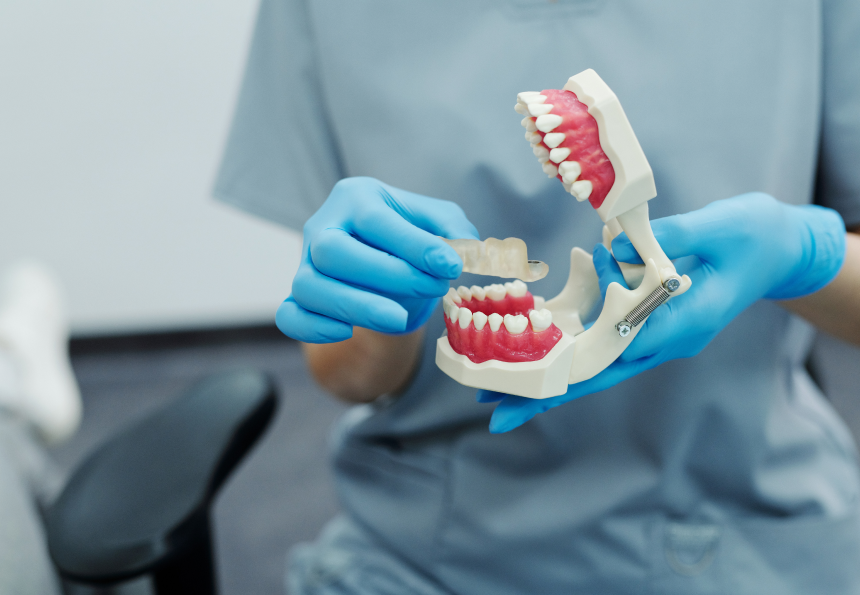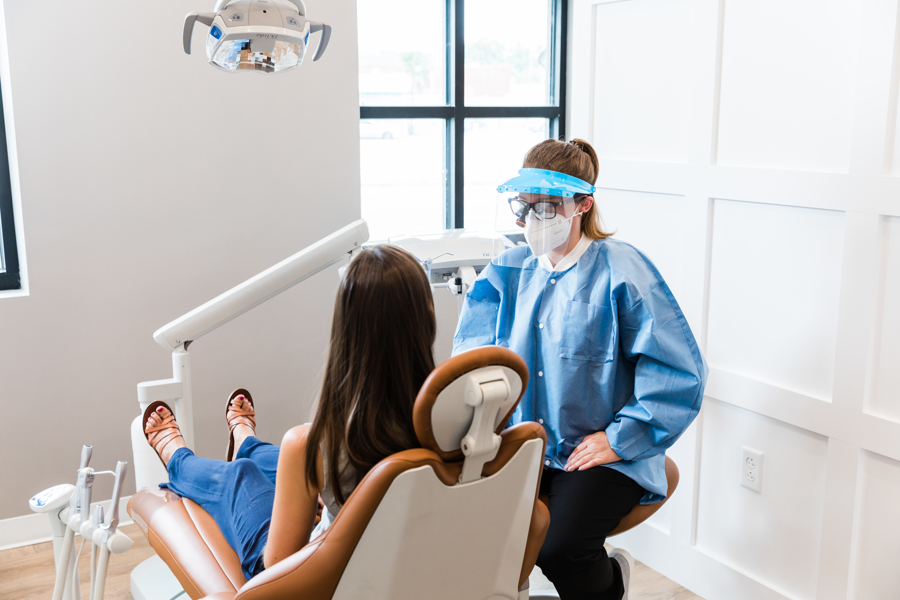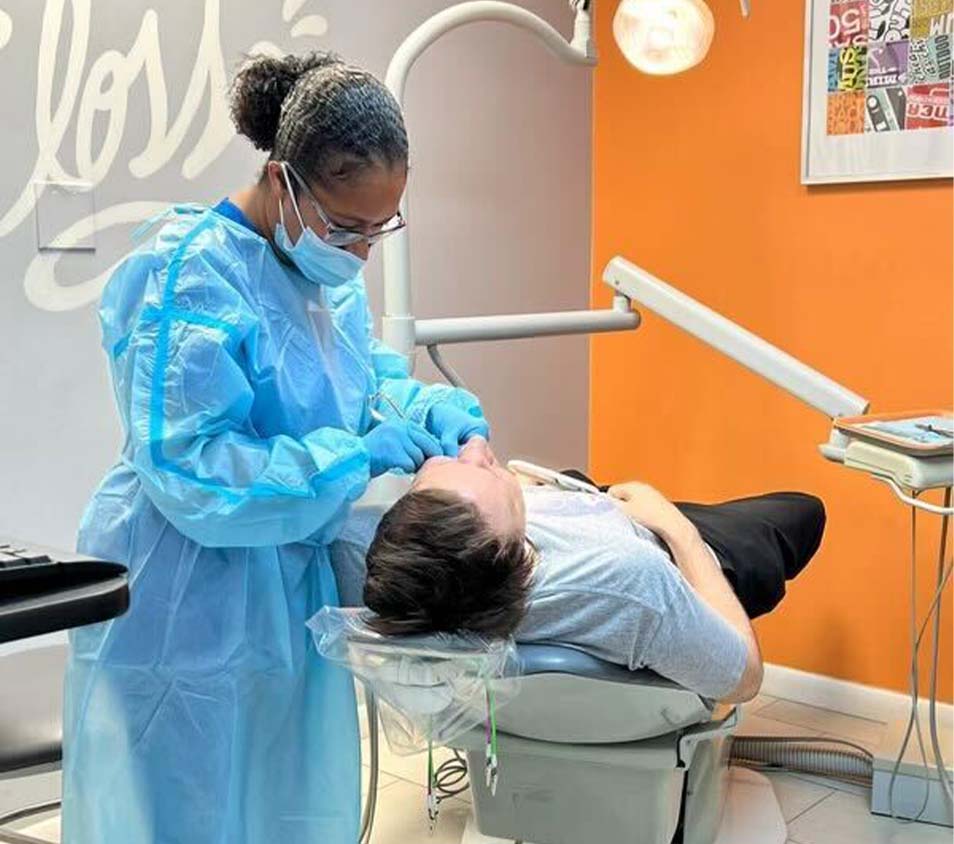Typical Concerns Regarding Dental Veneers Responded To
Oral veneers have come to be a significantly popular option for those looking to boost their smiles, yet several people remain uncertain concerning various elements of their use. Trick questions commonly emerge concerning the application procedure, long life, and potential threats associated with these aesthetic improvements. In addition, the difference in between porcelain and composite veneers can dramatically affect one's choice. As we discover these common queries, it ends up being necessary to consider not only the benefits but also the ramifications of deciding for oral veneers in search of a more certain appearance. What elements should one weigh before making such a decision?
What Are Dental Veneers?
Oral veneers are thin, custom-made coverings crafted from porcelain or composite resin that are created to cover the front surface of teeth. These dental prosthetics serve both aesthetic and practical objectives, giving a service for different oral blemishes, including discoloration, chips, spaces, and imbalance. By sticking to the teeth, veneers can dramatically enhance the overall appearance of a smile, creating an extra eye-catching and uniform look.
Porcelain veneers are particularly preferred for their natural translucency and tarnish resistance, making them a perfect choice for individuals looking for long-lasting results. On the other hand, composite resin veneers are normally less costly and can be applied in a single browse through, however they might not supply the same sturdiness as porcelain alternatives.
The decision to go with dental veneers commonly comes from a need for aesthetic enhancement, however patients ought to additionally think about variables such as the durability of the material, upkeep requirements, and the possible need for tooth reduction (Veneers). Eventually, dental veneers represent a functional and efficient option for accomplishing a radiant smile, satisfying specific cosmetic requirements while promoting confidence and self-confidence
How Are Veneers Applied?
The application process for veneers needs mindful planning and precision to make sure optimal results. The procedure usually begins with a comprehensive examination, where the dental practitioner evaluates the person's oral health, reviews wanted results, and identifies the ideal kind of veneers, whether porcelain or composite material.
When the treatment strategy is established, the dental practitioner prepares the teeth by getting rid of a slim layer of enamel, normally concerning 0.5 mm to 1 mm, to accommodate the veneer. This step is critical as it makes sure a correct fit and protects against the veneers from showing up cumbersome - Dental Veneers. After prep work, perceptions of the teeth are required to develop customized veneers that match the client's distinct dental framework and aesthetic choices
While the permanent veneers are being fabricated in an oral lab, short-term veneers might be put to safeguard the ready teeth. Once the long-term veneers are prepared, the dental professional will meticulously bond them to the teeth utilizing a strong oral adhesive. Final modifications are made to make certain proper positioning and bite, complied with by brightening for an all-natural look. The process finishes in a follow-up visit to keep track of the veneers' fit and the client's satisfaction with their brand-new smile.
What Are the Benefits?

Additionally, veneers are understood for their resilience and resistance to discoloring compared to all-natural teeth. Made from top quality products such as porcelain or composite material, they can preserve their look for many years with proper treatment. This durability makes them a functional investment in one's oral look.
In addition to aesthetic improvements, veneers can additionally add to boosted dental health. By covering harmed or compromised teeth, they can offer extra support and defense, helping to stop more degeneration or deterioration. This safety element can decrease the demand for a lot more extensive oral treatments in the future.

For How Long Do They Last?
With correct treatment and upkeep, dental veneers can last anywhere from 10 to 15 years, making them a long-lasting option for boosting one's smile. The durability of veneers mostly depends on the product used, the high quality of the preliminary placement, and the person's adherence to oral health techniques.
Porcelain veneers are known for their longevity and resistance to staining, generally lasting closer to the 15-year mark when looked after suitably. Composite veneers, while much more cost effective, may require replacement faster, often within 5 to 10 years as a result of their vulnerability to put on and discoloration.

Furthermore, putting on a mouthguard throughout sports or webpage nighttime can give added defense. Ultimately, while veneers provide a considerable visual enhancement, their durability is considerably influenced by the commitment to correct oral care and normal appointments with a dental specialist.
Exist Any Kind Of Threats?
Considering the transformative impacts of oral veneers, it is very important to recognize the potential threats related to their application. While veneers can improve the look of teeth, the procedure entails the removal of a thin layer of enamel, which can enhance tooth level of sensitivity and susceptability to degeneration.
One significant threat is the possibility of incorrect placement or suitable, leading to discomfort, bite misalignment, or also damages to the underlying tooth framework. Additionally, if the veneers are not maintained effectively, they can end up being tarnished or damaged with view it time, necessitating replacement.
Individuals may also experience allergic reactions to the products used in the veneers, specifically if they have level of sensitivities to specific dental composites. While veneers are resilient, they are not indestructible; excessive pressure from clenching or grinding can lead to cracks.
It is vital for clients to speak with a qualified dental professional to examine their individual dangers and to adhere to aftercare directions vigilantly. By recognizing these dangers, clients can make informed choices concerning their dental veneer therapy and guarantee the long life and success of their improvements.
Conclusion
In summary, dental veneers represent a beneficial cosmetic service for improving smiles, with factors to consider regarding their application, benefits, long life, and associated dangers. Their efficiency is influenced by elements such as the option of material, with porcelain offering exceptional durability compared to composite choices. Correct treatment and maintenance are necessary to make the most of the lifespan of veneers. Inevitably, notified decision-making pertaining to oral veneers can lead to sufficient aesthetic end results and enhanced dental health and wellness.
Dental veneers are thin, customized coverings crafted from porcelain or composite material that are made to cover the front surface area of teeth. After prep work, impacts of the teeth are taken to create personalized veneers that match the individual's special dental framework and aesthetic choices.
While the long-term veneers are being fabricated in an oral lab, temporary veneers might be put to secure the ready teeth. When the long-term veneers are ready, the dental practitioner will thoroughly bond them to the teeth making use of a solid dental adhesive. Ultimately, informed decision-making regarding dental veneers can lead to acceptable visual end results and boosted dental health.